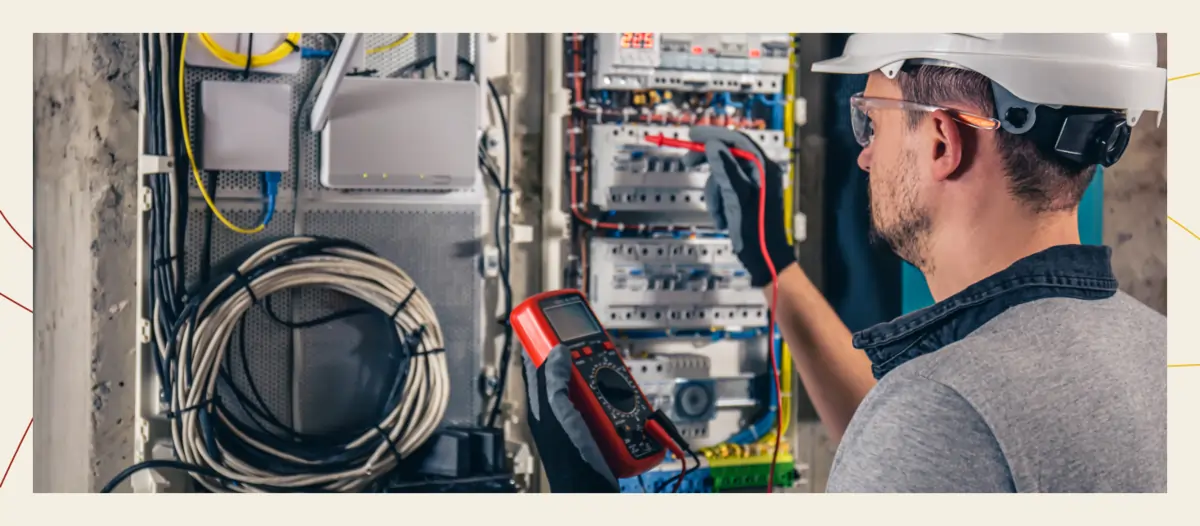
If you are of technical mindset and choosing a career, to become an electrician. As electrical engineering companies admit, there is a shortage of such technicians on the market and qualified electricians are considered as valuable items in their human assets. Besides, you can work as a self-employed electrician or even start your own business.
Table of contents
- Is engineering a good career?
- Electrician and electrical engineer salary
- Electrician skills
- How to become an electrician
- How to become a successful electrician
- Conclusion
Is engineering a good career?
Of course, here, we are talking about electrical engineering, electrician career path. To clarify, a career is good when it can bring a decent income and other important criteria are met:
- High demand on the job and service market now
- Good career path opportunities
- Job security in the future
- Low entry level
While we will cover the electrician salary in the next section, let’s discuss the crucial aspects we mentioned above regarding why to become an electrician.
High demand now
First, electrician services are currently in high demand. To verify this, just check how much humankind depends on electricity and electrical appliances. From lighting through heating, cooling, ventilating, and lifting, to manufacturing. From cooking and refrigerating to entertaining and even riding.
Indeed, electrician services are essential for both residential and commercial entities. And a moving green trend, with its shift to electrical vehicles and EV charging stations involvement, makes the demand for electrical engineering and electrician services even greater.
Good career path opportunities
The electrician career path could be exciting!
Starting from just a fitter who handles physical wiring, cabling, and jointing, you can grow to an electrical engineer who designs mains, circuits, and all these wiring, cabling, and jointing schemes.
Starting from a technician who installs, services, and repairs HVAC, cooking, refrigeration, and other electrical appliances for domestic customers, you can grow to service commercial entities. From shops, hotels, cafes, and restaurants to buildings, malls, and factories.
All while building your background of overcoming challenges, your relevance, and increasing your income.
Job security in the future
Rest assured, electricians are guaranteed their job security in the future.
First, it is hard to imagine our lives without lighting, heating, cooling, ventilating, lifting, using electrical appliances, and manufacturing equipment. Plus, there are many expanding fields that increase the demand for electrician services such as, for example, the expansion of EV charging facilities, which require qualified installation, servicing, and repair.
Second, as technologies are evolving, the job market is changing accordingly. For example, there are highs and lows in software development based on specific programming languages. In contrast, electricians face resilience as the fundamental laws of electricity are not changing.
Another modern challenge that will definitely affect many careers is AI expansion. To clarify, Artificial Intelligence may threaten to ones involved in designing, content-making, marketing, film-making, and even programming. However, electrical installations, fittings, repairs, and maintenance tasks are ones that can be handled only by hand, not by algorithms. So, electricians are secured against any AI replacement threats.
Low entry level
Here, it is worth mentioning that low entry level is both for becoming an electrician and starting your own electrical engineering business.
Is electrical engineering hard? Yes, it could be challenging in some of its tasks, especially regarding issue detection. But is it hard to become an electrician? No, especially as you start as a domestic electrician. Indeed, you do not have to spend years and budgets to become an electrician of an entry-level. Besides the ease of becoming an electrician lies in the fact that you can reach your goal through different routes, which we will discuss later.
Equally, it is easy to start your own electrical engineering business. To clarify, while many other businesses require hefty initial capital to start, the startup cost in the electrical business could be even lower than an average electrician salary. Then, as you register your company, you can list your business on various electrical engineering marketplaces and start getting orders.
Electrician and electrical engineer salary
As we mentioned above, the income aspect is one of the most important when deciding what career to start. And electrical engineer salary in the UK is more than justifying. Electrician average salary in the UK is somewhat lower than that of electrical engineers but still higher than that of many other careers.
But let’s turn to the numbers and job vacancies analysis.
According to data provided by National Career Service:
- Average electrician salary varies between £18,000 and £42,000
- Average electrical engineer salary varies between £27,000 and £58,000
To clarify, here, the lower numbers are annual starter electrical engineer and newly qualified electrician salaries. The upper numbers show how much experienced electricians and engineers make a year. So, on average, a newly qualified electrician salary starts from £18,000 and rapidly grows as the technician gains experience. A highly qualified electrician salary, on average, starts from £42,000. The annual average electrical engineer salary for starters is about £27,000 while senior electrical engineers, according to statistics, can make about £58,000 a year.
Now, let’s turn to job vacancies and learn what wages are offered on the real market. Most job vacancies for senior electrical engineers offer £50,000 – £55,000 a year. Moreover, there are job offers with wages of up to £80,000. It is noteworthy, that many of such jobs involve dealing with EV charging stations and renewables. To senior electricians and electrical technicians, employers are ready to pay about £35,000 – £45,000 per annum, while electrical supervisors are offered up to £60,000 (with up to £80,000, in some job offers).
To conclude the survey of electrician and electrical engineer earnings in the UK, it is important to mention that self-employed electrician salary is, typically, 50–60% more than the average wage a full-time job offers to experienced electricians and can reach up to £67,000 – £75,000 a year.
Electrician skills

Becoming an electrician requires both hard and soft skills. Soft skills are general and could be applicable to most careers. So, we wouldn’t elaborate on soft skills in detail but just outline the main ones:
- Pro-active approach and initiative
- Problem solving and decision making
- Thoroughness and detail-attentiveness
- Time management and self-organisation
- Effective communication and collaboration
In contrast, hard electrician skills involve technical skills and knowledge that are crucial for dealing with the mains, circuits, wiring, electrical appliances and equipment, etc. In other words, it is about the electrical qualification that enables a person to execute the activities they are engaged in and handle tasks that are within their duty.
Here is a basic list of hard electrician skills:
- Knowing electrical science, its principles, methods, and procedures
- Blueprint-reading skills
- Familiarity with building and construction in general
- Familiarity with up-to-date electrical trends and technologies in the industry
- Familiarity with wiring and safety regulations
The first five bullet points specify the technical skills necessary to handle electrical installations, maintenance, and repairs. The last one is about skills necessary to ensure safe work progression.
How to become an electrician

First of all, to become an electrician in the UK, you must get at least Level 3 NVQ – 2357 electrical qualification.
Then you can apply for an ESC Card to become a certified electrician allowed to work on site. If you plan to work only with residential customers and handle small domestic issues, you can opt to become a registered domestic electrician within the Competent Person Scheme (CPS).
There are electrical apprenticeship and via non-apprenticeship routes to getting an electrician qualification.
An electrical apprenticeship is a great route to get real on-site experience, which employers value so much. However, it is the longest path as you will be enrolled in some college onto Level 3 NVQ Apprenticeship qualification. Besides, if you are over 24, you will have to fund your enrollment on your own.
So, if you are thinking about how to become an electrician at 30 years old, you possibly are interested in how to become an electrician without an apprenticeship in the UK.
And here, a non-apprenticeship route is what you need to go. To clarify, this is a route of undertaking NVQ Diploma courses that authorized training centers provide. In this case, typically, you need to start with the Level 2 NVQ Diploma course and then move to the Level 3 NVQ Diploma. The courses provide you with a must-have basis in electrical installation – the 2365 electrical qualification.
However, to become a fully qualified electrician, you need to take one more course – Level 3 NVQ in Electrical Installations, where you can get the 2357 electrical qualification, with which you can apply for the card.
How long does it take to become an electrician?
If you go an apprenticeship route, becoming a fully qualified electrician will take, typically, 3 years.
If you go a non-apprenticeship route and undertake NVO courses, you can get your qualification in 6 months – typically, 2 months for a course, which could be up to three in total. Moreover, some training centers offer intensive courses of shorter duration. So, if you take such courses, you can become an electrician even earlier.
How much does it cost to become an electrician in the UK?
The average cost of a non-apprenticeship route may amount to £5,000 – £8,000. Via apprenticeship, there is a free option. However, this free option is available mostly for 16-24-year-old persons, but not for those who are, for example, 30 or 40 years old.
How to become a successful electrician

You may work as a company-employed electrician. Or you may work as a self-employed electrician. Or you may even run your own electrical engineering business. And in all these cases, you definitely want to become a successful electrician.
So, how to succeed? In general, there are the following aspects that factor into success:
- Certification (an ESC Card or, at least, CPS registration)
- Hands-on experience
- Marketing
The first two are a must, no matter whether you make a career as an employed, self-employed, or business-running electrician. To clarify, certification allows you to stay within the law frame and increases customer trust. Hand-on experience is a valuable background that will help you handle even the most challenging task. Therefore, both customers and employers prefer experienced technicians. So, the more experience you have got under your belt, the more value you have both for customers and employers.
The last aspect, marketing, is especially important for self-employed electricians or those who run their own company. That is to say, it helps attract customers and get orders.
Marketing can include website development and promotion, advertising and even publishing valuable content on social media. Another valuable marketing approach is listing on engineering aggregators, such as Royal Keepers. To clarify, such aggregators are the platforms, where customers turn to when looking for a tech to cover their electrical engineering or appliance repair needs.
Conclusion
So, is electrician a good career? In short, yes, it is a very good, decent-earning-promising, and future-secured career. Easy, quick, and low-cost to start and succeed. Moreover, it is a great opportunity to work as a self-employed or start your own business in electrical appliance repair and electrical engineering.
